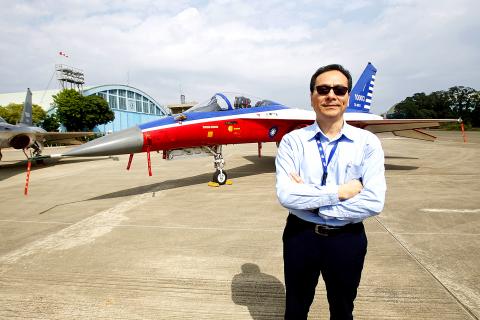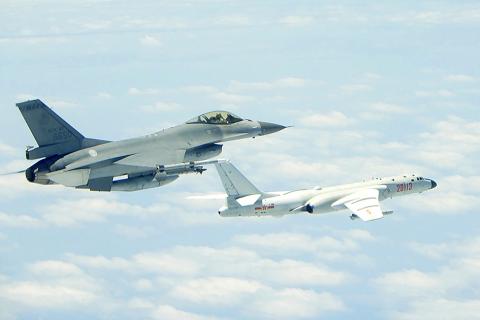Standing on his company’s sprawling campus in central Taiwan, Lin Nan-juh (林南助) said he is able to make any plane his government calls for.
“We can do whatever’s asked,” said Lin, president of Aerospace Industrial Development Corp (AIDC), a leader in the defense industry serving Taiwan.
It is a bold statement with potentially major significance for Taiwan’s democratic survival as it seeks to build up its domestic defense industry in the face of China’s warnings and the reluctance of foreign arms suppliers to provide it with the planes, ships, submarines and other hardware it needs to defend its 23 million people.

Photo: AP / Ministry of National Defense
While the US — which is legally bound to respond to threats to Taiwan — continues to be its main arms supplier, Taiwan is increasingly looking to replace those politically fraught, touch-and-go deals with domestic production that is reliable as well as technologically advanced.
Taiwan’s indigenous systems are “both a source of national pride and a product of necessity,” said David An, senior research fellow with the Washington-based policy incubator Global Taiwan Institute. “As it’s commonly said, necessity is the mother of invention.”
The self-reliance policy has been strongly promoted by President Tsai Ing-wen (蔡英文), whose government has been shunned by Beijing since shortly after she took office more than two years ago.

Photo: AP / Ministry of National Defense
Defense is included in Tsai’s economic program targeting eight industries for innovation and job creation, with the government helping match its defense needs with the abilities of Taiwanese companies.
China’s recent actions have underscored the risk for Taiwan.
Beijing has been upping pressure by cutting its already tenuous diplomatic links [with Taipei] and has sent military planes and an aircraft carrier close to Taiwan multiple times.
China has the world’s second-largest defense budget behind the US, significantly boosting its ability to blockade, attack and possibly invade Taiwan.
Taiwan’s domestic arms industry got started in the 1970s, more than two decades after Chiang Kai-shek’s (蔣介石) Nationalist forces fled China for the former Japanese colony after Mao Zedong’s (毛澤東) Chinese Communist Party seized power in 1949.
Adaption and development of foreign technology gave companies such as AIDC much of what they needed to grow and help keep the peace with the mainland, said Mei Fu-shing, (梅復興) director of the Taiwan Security Analysis Center, a research and consulting practice based in New York.
“Indigenously developed and produced weapons have contributed materially to deterrence in the Taiwan Strait over the past three or four decades,” Mei said.
Taiwan’s capabilities have improved of late in both quality and technical sophistication, Mei said, pointing to the production of air-to-air missiles as an example.
“Taiwan’s defense industry obviously has progressed,” making it less reliant on foreign sources, he said.
Along with protest actions from Beijing — including the suspension of exchanges with the US military after a US$6.4 billion arms package for Taiwan was announced in 2010 — US sales are constrained by concerns about the leaking of sensitive advanced technology across the Taiwan Strait to China.
Despite that, such sales continue, with US President Donald Trump’s administration notifying the US Congress last year of its intent to approve seven proposed deals for technical support, anti-radiation missiles, torpedoes and other technology valued at about US$1.42 billion.
The Trump administration last month agreed to allow US firms with the technology to build much-needed diesel-electric submarines.
Taiwan’s navy operates just two aging subs bought from the Netherlands in the 1980s.
Analysts say sales of technology are less likely to prompt a strong response from China than those of complete systems such as planes or submarines.
Along with fighter jets and other aircraft, Taiwanese contractors already make anti-ship, surface-to-air and air-to-air missiles, as well as missile boats and Clouded Leopard armored vehicles.
Taiwan has long been known worldwide for its civilian high-tech industry and about 200 small and mid-sized companies work in defense.
AIDC and the National Chung-shan Institute of Science and Technology are among the larger contractors.
The aerospace firm reported sales income of US$235 million and a net profit in the third quarter of last year, the most recent made public online.
More than 3,000 people work on new aircraft designs at AIDC’s tree-lined campus, complete with a restaurant and a swimming pool. One of its planes marks a front entrance.
Despite the advances, Taiwan will never be able to quit buying advanced weapons from other countries, Ministry of National Defense spokesman Major General Chen Chung-chi (陳中吉) said.
Propulsion systems and engines for ships and aircraft are a particular need, and Taiwan sometimes finds that imports cost less than local production.
Yet such sales carry the risk of being used as bargaining chips to gain concessions from Beijing, particularly on trade.
Ultimately, officials in Washington might help Taiwan’s military again only if they see its capability decline, said Alexander Huang (黃介正), an associate professor of strategic studies at Tamkang University.
“Taiwan worries that there might be a time that we can’t buy the weapon system that we want, so we better build up our indigenous defense industry capability,” Huang said.

‘DENIAL DEFENSE’: The US would increase its military presence with uncrewed ships, and submarines, while boosting defense in the Indo-Pacific, a Pete Hegseth memo said The US is reorienting its military strategy to focus primarily on deterring a potential Chinese invasion of Taiwan, a memo signed by US Secretary of Defense Pete Hegseth showed. The memo also called on Taiwan to increase its defense spending. The document, known as the “Interim National Defense Strategic Guidance,” was distributed this month and detailed the national defense plans of US President Donald Trump’s administration, an article in the Washington Post said on Saturday. It outlines how the US can prepare for a potential war with China and defend itself from threats in the “near abroad,” including Greenland and the Panama

The High Prosecutors’ Office yesterday withdrew an appeal against the acquittal of a former bank manager 22 years after his death, marking Taiwan’s first instance of prosecutors rendering posthumous justice to a wrongfully convicted defendant. Chu Ching-en (諸慶恩) — formerly a manager at the Taipei branch of BNP Paribas — was in 1999 accused by Weng Mao-chung (翁茂鍾), then-president of Chia Her Industrial Co, of forging a request for a fixed deposit of US$10 million by I-Hwa Industrial Co, a subsidiary of Chia Her, which was used as collateral. Chu was ruled not guilty in the first trial, but was found guilty

A wild live dugong was found in Taiwan for the first time in 88 years, after it was accidentally caught by a fisher’s net on Tuesday in Yilan County’s Fenniaolin (粉鳥林). This is the first sighting of the species in Taiwan since 1937, having already been considered “extinct” in the country and considered as “vulnerable” by the International Union for Conservation of Nature. A fisher surnamed Chen (陳) went to Fenniaolin to collect the fish in his netting, but instead caught a 3m long, 500kg dugong. The fisher released the animal back into the wild, not realizing it was an endangered species at

DEADLOCK: As the commission is unable to forum a quorum to review license renewal applications, the channel operators are not at fault and can air past their license date The National Communications Commission (NCC) yesterday said that the Public Television Service (PTS) and 36 other television and radio broadcasters could continue airing, despite the commission’s inability to meet a quorum to review their license renewal applications. The licenses of PTS and the other channels are set to expire between this month and June. The National Communications Commission Organization Act (國家通訊傳播委員會組織法) stipulates that the commission must meet the mandated quorum of four to hold a valid meeting. The seven-member commission currently has only three commissioners. “We have informed the channel operators of the progress we have made in reviewing their license renewal applications, and